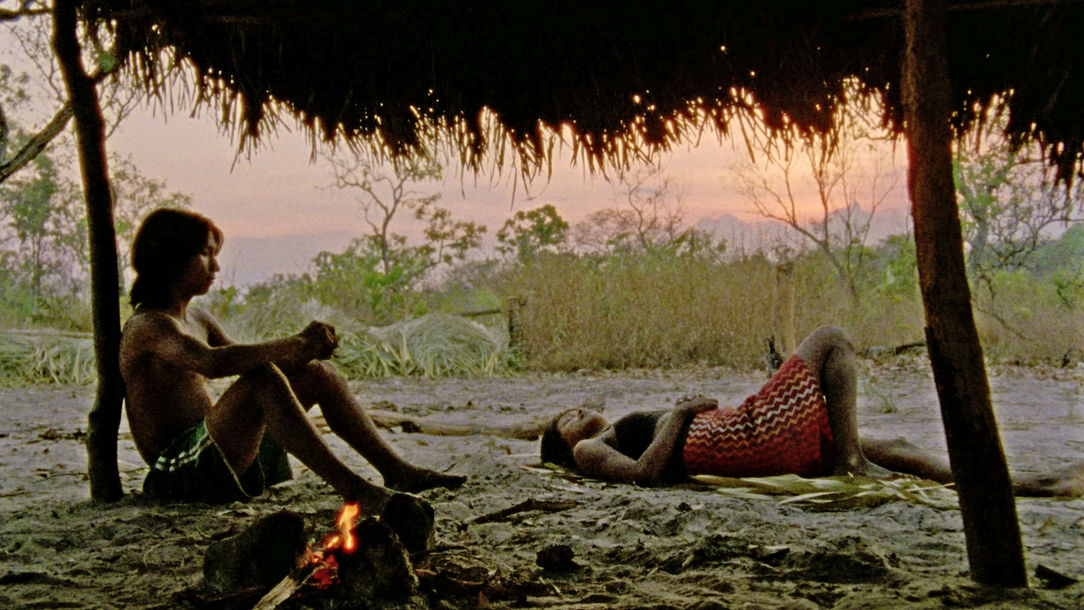The Dead and the Others review – dreamlike journey set in indigenous Brazilian community | reviews, news & interviews
The Dead and the Others review – dreamlike journey set in indigenous Brazilian community
The Dead and the Others review – dreamlike journey set in indigenous Brazilian community
Cannes-winning docudrama observes the clash between ancient tradition and modern life

The Dead and the Others won the Un Certain Regard Jury Prize at Cannes in 2018, perhaps due to the supreme devotion to subject and place that this macabre work exhibits. It is a film of startling visual power and mood, with a drifting storyline that becomes bizarrely captivating.
Part of the documentary effect comes from the directors’ patient observation of landscape. Shot in 16mm in a rural region of lush forests, hidden waterfalls and burnt plains, the images that emerge capture the glowing mystery of place. Yet the camera is no foreign observer. Eerie close-ups and hand-held takes add to the mood of immersion. In place of a conventional soundtrack, natural sounds of cicadas, trickling water and wind create their own orchestral swell.
The narrative follows fifteen-year-old Ihjãc (Henrique Ihjãc Krahô) who hears a troubling message from his dead father. Ihjãc has failed to carry out the necessary funeral rituals that are a part of his tribe’s doctrine of farewelling the dead. Ihjãc is unwilling to cut the emotional bond he still shares with his father, but which his tribe demands of him. We witness the way he painfully distances himself from his wife and relatives.
 He falls into emotional turmoil following another dream-scene in which a macaw tells him that he will become a shaman. Unwilling to confront this personal mystery, Ihjãc leaves his tribe to pursue treatment in a nearby town. The departure feels abrupt and jarring as the film moves from rural isolation to sterile hospital interiors. Ihjãc is not merely confronting his past but tearing away his inherited identity. Yet the directors manage to unobtrusively frame this journey within the broader clash between ancient and modern ways of living.
He falls into emotional turmoil following another dream-scene in which a macaw tells him that he will become a shaman. Unwilling to confront this personal mystery, Ihjãc leaves his tribe to pursue treatment in a nearby town. The departure feels abrupt and jarring as the film moves from rural isolation to sterile hospital interiors. Ihjãc is not merely confronting his past but tearing away his inherited identity. Yet the directors manage to unobtrusively frame this journey within the broader clash between ancient and modern ways of living.
In order to achieve a subtle pathos in this messaging, the film holds firm to its slow burn pacing. Scenes drift in and out of each other with a dreamlike languor that demands persistent attention from viewers. Almost all the actors were unprofessional. Many scenes were shot with completely improvised dialogue. The casual doco-effect is achieved, but many scenes thereby lack tension or pay off.
Renée Nader Messora’s cinematography always seems to rescue the situation by extracting the uncanny beauty lurking within place. In balance with the low-key documentary style, each shot seems perfectly controlled, and fine-tuned to disclose just enough to invite the viewer in. In one long shot we see the decayed ruins of a building set within an overgrowth of trees and shrubs, hinting at past government presence in the region. It is a subtle way of suggesting the lasting contact and contest between cultures that the film invites us to question.
rating
Explore topics
Share this article
The future of Arts Journalism
You can stop theartsdesk.com closing!
We urgently need financing to survive. Our fundraising drive has thus far raised £49,000 but we need to reach £100,000 or we will be forced to close. Please contribute here: https://gofund.me/c3f6033d
And if you can forward this information to anyone who might assist, we’d be grateful.

Subscribe to theartsdesk.com
Thank you for continuing to read our work on theartsdesk.com. For unlimited access to every article in its entirety, including our archive of more than 15,000 pieces, we're asking for £5 per month or £40 per year. We feel it's a very good deal, and hope you do too.
To take a subscription now simply click here.
And if you're looking for that extra gift for a friend or family member, why not treat them to a theartsdesk.com gift subscription?
more Film
 The Perfect Neighbor, Netflix review - Florida found-footage documentary is a harrowing watch
Sundance winner chronicles a death that should have been prevented
The Perfect Neighbor, Netflix review - Florida found-footage documentary is a harrowing watch
Sundance winner chronicles a death that should have been prevented
 Blu-ray: Le Quai des Brumes
Love twinkles in the gloom of Marcel Carné’s fogbound French poetic realist classic
Blu-ray: Le Quai des Brumes
Love twinkles in the gloom of Marcel Carné’s fogbound French poetic realist classic
 Frankenstein review - the Prometheus of the charnel house
Guillermo del Toro is fitfully inspired, but often lost in long-held ambitions
Frankenstein review - the Prometheus of the charnel house
Guillermo del Toro is fitfully inspired, but often lost in long-held ambitions
 London Film Festival 2025 - a Korean masterclass in black comedy and a Camus classic effectively realised
New films from Park Chan-wook, Gianfranco Rosi, François Ozon, Ildikó Enyedi and more
London Film Festival 2025 - a Korean masterclass in black comedy and a Camus classic effectively realised
New films from Park Chan-wook, Gianfranco Rosi, François Ozon, Ildikó Enyedi and more
 After the Hunt review - muddled #MeToo provocation
Julia Roberts excels despite misfiring drama
After the Hunt review - muddled #MeToo provocation
Julia Roberts excels despite misfiring drama
 Ballad of a Small Player review - Colin Farrell's all in as a gambler down on his luck
Conclave director Edward Berger swaps the Vatican for Asia's sin city
Ballad of a Small Player review - Colin Farrell's all in as a gambler down on his luck
Conclave director Edward Berger swaps the Vatican for Asia's sin city
 London Film Festival 2025 - Bradley Cooper channels John Bishop, the Boss goes to Nebraska, and a French pandemic
... not to mention Kristen Stewart's directing debut and a punchy prison drama
London Film Festival 2025 - Bradley Cooper channels John Bishop, the Boss goes to Nebraska, and a French pandemic
... not to mention Kristen Stewart's directing debut and a punchy prison drama
 London Film Festival 2025 - from paranoia in Brazil and Iran, to light relief in New York and Tuscany
'Jay Kelly' disappoints, 'It Was Just an Accident' doesn't
London Film Festival 2025 - from paranoia in Brazil and Iran, to light relief in New York and Tuscany
'Jay Kelly' disappoints, 'It Was Just an Accident' doesn't
 Iron Ladies review - working-class heroines of the Miners' Strike
Documentary salutes the staunch women who fought Thatcher's pit closures
Iron Ladies review - working-class heroines of the Miners' Strike
Documentary salutes the staunch women who fought Thatcher's pit closures
 Blu-ray: The Man in the White Suit
Ealing Studios' prescient black comedy, as sharp as ever
Blu-ray: The Man in the White Suit
Ealing Studios' prescient black comedy, as sharp as ever
 The Woman in Cabin 10 review - Scandi noir meets Agatha Christie on a superyacht
Reason goes overboard on a seagoing mystery thriller
The Woman in Cabin 10 review - Scandi noir meets Agatha Christie on a superyacht
Reason goes overboard on a seagoing mystery thriller
 London Film Festival 2025 - crime, punishment, pop stars and shrinks
Daniel Craig investigates, Jodie Foster speaks French and Colin Farrell has a gambling habit
London Film Festival 2025 - crime, punishment, pop stars and shrinks
Daniel Craig investigates, Jodie Foster speaks French and Colin Farrell has a gambling habit

Add comment